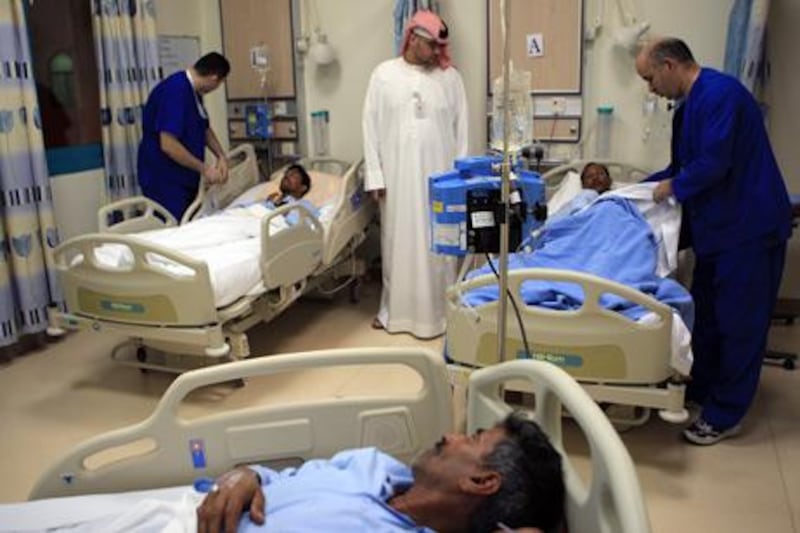AL GHARBIA // More than 100 workers at a labour camp were rushed to hospital with food poisoning symptoms over the weekend, causing Madinat Zayed hospital to declare a state of emergency.
The hospital was put on alert shortly before midday on Saturday after reports that several workers at a nearby camp were vomiting and complaining of severe nausea, high fever and diarrhoea.
Dr Rodhan Kathir,medical director at the hospital, said the first cases started arriving soon after.?“Between noon and 7pm there was a continuous influx of patients in groups ranging from two to 30 at a time,” he said.
_______________
Also
• Chef to pay blood money over children's food deaths
• Diner died after eating seafood and duck liver
________________
Of the 2,000 workers at the camp, 102 were taken to hospital on Saturday and yesterday, from 6am, 15 more were admitted.
“Around 117 workers were brought to the hospital over the two days, all of whom we diagnosed with food poisoning,” said Dr Kathir.
Dr Emad Nasrallah, head of the emergency department at the hospital, said a “code orange” was declared.
“This means we were in a state of emergency; it was almost like a disaster at the hospital.
“We have never had that many patients at one time,” he said.
A further 119 workers were treated at the labour camp on Saturday, after a team of two nurses and one doctor were sent to the workers’ quarters to determine which cases were serious enough to be outsourced and which could be treated on-site. The team spent four hours in the labour camp, classifying patients and forewarning the hospital of how many more patients to expect throughout the course of the day.
“We admitted 44 cases overnight, as medium to severe cases of food poisoning. Only one case was classified as a critical case; he was the first worker to arrive at the hospital on Saturday and he will remain at the hospital for another 24 hours for observation,” Dr Kathir said.
Yesterday, half the workers who had been admitted to hospital were released, he said. The remaining workers are expected to be released today.
Ghanem al Mazrouei, director general of the hospital, said that other doctors in the area were asked to come in to the hospital and help with the unprecedented influx of patients.
“We used our entire hospital’s capacity: nurses, doctors and technicians from all departments. Thank God, the situation remained under control at all times and we never suffered a shortage of staff or supplies,” he said.
It was a difficult day, said Mr al Mazrouei, and the situation did not calm down until 10pm on Saturday.
“The worst is over, and we are no longer in a state of emergency,” he said.
An ongoing investigation on the cause of the food poisoning is being conducted by the Health Authority-Abu Dhabi and the Abu Dhabi Food Control Authority (ADFCA).
Mohammed al Reyaysa, the director of communications at ADFCA, said that food samples were gathered from the labour camp to be investigated while the hospital conducted its own investigation on samples collected from the patients.
“We will do the necessary tests to examine what exactly caused the poisoning,” Mr al Reyaysa said. “We are also investigating whether the company that catered the food to the labourers had a licence to cater food outside their premises.
“It is a serious incident and we are looking at all aspects of it to make sure nothing of this sort happens in the future.”
The ADFCA said it would make the results of the investigation public as soon as possible.
Dr Kathir said such an emergency should never be allowed to happen again. “We have never seen such a large number of food poisoning cases occur at one time; this is unacceptable.”
The workers admitted to hospital said they ate a variety of different meals on Friday evening: some had chicken, some had meat, some had vegetables with fish and others said they ate “saloona”, a traditional Indian stew.
Soon afterwards, and throughout the night, the afflicted workers began to suffer from nausea, dizziness, fever, pain in the joints and diarrhoea.
hkhalaf@thenational.ae





